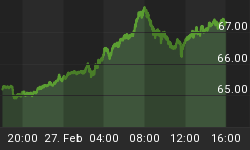Today, October 12, 2006, China reported that crude oil imports jumped 24 percent over the same month a year earlier.
China's Oil Imports Surge to Record High
Thursday October 12, 7:23 am ET
By Elaine Kurtenbach, AP Business WriterChina's Oil Imports Surge to Record High As Country Begins Filling Strategic Reserves
SHANGHAI, China (AP) -- China's oil imports surged to a record high 3.3 million barrels a day in September, the government reported Thursday, as the country recently began filling its newly built strategic oil reserves.
Preliminary data from the General Administration of Customs showed crude oil imports jumped 24 percent over the same month a year earlier to 13.5 million metric tons (15 million U.S. tons) in September.
Doing The Math....
Does anyone note the complete and utter disconnect as to how China can be importing 24% more crude - year over year - in the face of declining output from the world's super giant oil fields [Cantarell - Mexico, Burgan - Kuwait, Ghawar - Saudi Arabia, Prudhoe Bay - Alaska, North Sea etc.]? Never mind the fact that the U.S. Gulf Coast never did recover from lost production of both nat. gas and crude in the wake of Katrina - much of which has NEVER been replaced.
Geepers, if we are to believe government reports, there is so much oil sloshing around in the world - that, Ripley's Believe It or Not - the Strategic Petroleum Reserve was even able to "top up" to the tune of an additional 800,000 barrels thus far in October?
Despite all of this anecdotal evidence, the government's EIA says that oil demand for 2006 is less than 2005 [I can only assume to justify plunging energy prices] due to an unusually warm winter,
"For the first 6 months of 2006, average demand was down 130,000 bbl/d, or 0.6 percent, from the previous year due to mild weather -- which reduced heating oil, residual fuel oil, and propane consumption -- and rapidly rising prices, which greatly affected motor gasoline and jet fuel demand growth."
It would seem to me that IF the U.S. economy was demanding any meaningful amount LESS energy, for reasons other than climate, on a year over year comparison - this would CATEGOROCALLY imply recession - absent an offsetting productivity increase - wouldn't it? Has government economic data reported any sign of a recession?
But On Second Look....
According to Wikipedia,
"distillate usually refers to fuel oils produced through distillation, such as diesel and heating oil. This distinguishes them from the residual fuel oils, which are made from the residue left after distillation."
Now, when we review the EIA's graph below, we can clearly see that DISTILLATE growth [at Oct. 12, 2006] is POSITIVE! What I'd really like to know is what OTHER is - because that is what is making their annual demand projections appear "negative"?

With the above graph CLEARLY demonstrating POSITIVE GROWTH in the consumption of distillates in the U.S. - how could any price decline be attributed to lessening of demand in the same?
The Fudge Factor or, Is Somebody Fibbing?
The anecdotal data above IS COMPLETELY INCONSISTENT WITH DECLINING PRICES OF ENERGY.
So, let's try to make some sense of all this....
The explosive growth of derivatives goes far to explain how / why prices are declining. 5.5 TRILLION GROWTH in a derivatives book at one bank [J.P. Morgan Chase] in one quarter should be sounding ALARM BELLS all over the world as to what is really going on.
Does anyone beside me make a connection between the "insanely explosive growth" of J.P. Morgan's derivatives book and plunging energy prices in the face of seemingly structural supply / demand imbalances?
Risk magazine, January 2006
J.P. Morgan was named Risk magazine's Energy derivatives house of the year in their January issue. According to Risk, "J.P. Morgan has emerged as a key player in energy derivatives over the past year." Since 2004, under the guidance of Beau Taylor, global co-head of Energy, the firm has built a leading energy trading practice. Focus has extended from natural gas and crude exotic derivatives to include electricity, coal and emissions trading.
Has it occurred to anyone that physical inventory in the Strategic Petroleum Reserve [SPR] is about as easily counted and measured as the GOLD in Ft. Knox or West Point?















